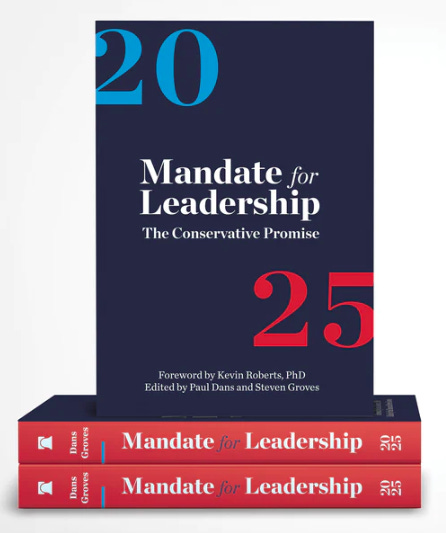Project 2025 Publishes Comprehensive Policy Guide, ‘Mandate for Leadership: The Conservative Promise’
50 years ago The Heritage Foundation prepared a similar suggested plan for Ronald Reagan. Look how that turned out . . .
Apr 21, 2023
WASHINGTON—With the goal of shaping policy decisions among presidential candidates, the 2025 Presidential Transition Project announced the publication of the ninth edition of “Mandate for Leadership: The Conservative Promise.” It’s the earliest publication of “Mandate” ever—months before candidates square off in the first presidential primary debate.
A comprehensive policy guide for the next conservative U.S. president, the book pulls from the expertise of hundreds of political appointees, policy scholars, and conservative leaders across the conservative movement. The book builds upon the legacy of the 1981 edition of “Mandate for Leadership,” which appeared on The Washington Post’s paperback bestseller list.
“Mandate for Leadership: The Conservative Promise” offers both specific proposals for addressing every major issue facing the country and a blueprint for how to restructure each agency to solve those issues.
Among the recommendations in this edition:
Restore the integrity of the Department of Justice to ensure accountability by giving the FBI a hard rest, ensuring consistent litigation decisions, and enforcing immigration laws.
Solidify our border by restructuring the Department of Homeland Security and its priorities in ways that streamline the immigration process, end unclear immigration visas, and create a more secure immigration process.
Break up the Department of Education to strengthen education freedom, enhance parental rights in education, and protect taxpayers from student loan “forgiveness.”
“Mandate for Leadership: The Conservative Promise” features 30 chapters spanning all aspects of the federal government. Editors Paul Dans, director of Project 2025, and Steven Groves, the Margaret Thatcher fellow at Heritage, worked with more than 35 primary authors and hundreds of contributors to assemble the 900-page book, which will be distributed Friday at Heritage’s two-day Leadership Summit in National Harbor, Maryland.
Heritage President Dr. Kevin Roberts released the following statement Friday praising the publication:
“For over two years, the Left has ignored the voice of everyday Americans leading to crippling inflation, biological males dominating women’s sports, rampant violence, and a crisis in education not seen in decades. Our country is all but unrecognizable.
“This is why the conservative movement is coming together to prepare for the next conservative administration. Heritage is convening the conservative movement behind the policies to ensure that the next president has the right policy and personnel necessary to dismantle the administrative state and restore self-governance to the American people.
“‘The Conservative Promise’ is just the first step in preparing future conservative leaders for the task of serving their country, and it will continue to guide the movement-wide coalition. We know what time it is; the conservative movement is on offense to restore our great nation.”
Since the first edition of “Mandate for Leadership” more than 40 years ago, this “policy bible” aims to provide administrations with a blueprint of policy solutions. The Reagan administration implemented nearly half of the ideas included in the first edition by the end of his first year in office, while the Trump administration embraced nearly 64% of the 2016 edition’s policy solutions after one year.
The following is a list of the 30 chapters and authors for each.
Chapter 1: White House Office, Rick Dearborn
Chapter 2: Executive Office of the President of the United States, Russ Vought
Chapter 3: Central Personnel Agencies: Donald Devine, Dennis Dean Kirk, and Paul Dans
Chapter 4: Department of Defense, Christopher Miller
Chapter 5: Department of Homeland Security, Ken Cuccinelli
Chapter 6: Department of State, Kiron K. Skinner
Chapter 7: Intelligence Community, Dustin J. Carmack
Chapter 8: U.S. Agency for Global Media, Mora Namdar; Corporation for Public Broadcasting, Mike Gonzalez
Chapter 9: Agency for International Development, Max Primorac
Chapter 10: Department of Agriculture, Daren Bakst
Chapter 11: Department of Education, Lindsey M. Burke
Chapter 12: Department of Energy and Related Commissions, Bernard L. McNamee
Chapter 13: Environmental Protection Agency, Mandy M. Gunasekara
Chapter 14: Department of Health and Human Services, Roger Severino
Chapter 15: Department of Housing and Urban Development, Benjamin S. Carson, Sr., MD
Chapter 16: Department of the Interior, William Perry Pendley
Chapter 17: Department of Justice, Gene Hamilton
Chapter 18: Department of Labor and Related Agencies, Jonathan Berry
Chapter 19: Department of Transportation, Diana Furchtgott-Roth
Chapter 20: Department of Veterans Affairs, Brooks D. Tucker
Chapter 21: Department of Commerce, Thomas F. Gilman
Chapter 22: Department of the Treasury, William L. Walton, Stephen Moore, and David R. Burton
Chapter 23: Export-Import Bank, Veronique de Rugy and Jennifer Hazelton
Chapter 24: Federal Reserve, Paul Winfree
Chapter 25: Small Business Administration, Karen Kerrigan
Chapter 26: Trade, Peter Navarro and Kent Lassman
Chapter 27: Securities and Exchange Commission, David R. Burton; Consumer Financial Protection Bureau, Robert Bowes
Chapter 28: Federal Communications Commission, Brendan Carr
Chapter 29: Federal Election Commission, Hans A. von Spakovsky
Chapter 30: Federal Trade Commission, Adam Candeub
Mandate for Leadership: The Conservative Promise (Paperback)
Tired of missing the real news? Tired of censorship? Tired of our corrupt liberal mainstream press that only shows you what they want you to see? Subscribe to Ineptocracy Chronicles today and get the other side of the real news in your inbox daily. It’s free.
Ineptocracy
A system of government where the least capable to lead are elected by the least capable of producing, and where the members of society least likely to sustain themselves or succeed, are rewarded with goods and services paid for by the confiscated wealth of a diminishing number of producers
.






